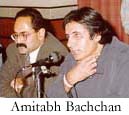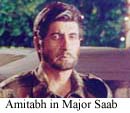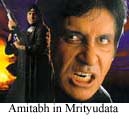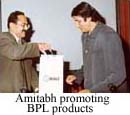The Big B Interview, Part I: 'I have never been confident about my career'
The Big B Interview, Part II: 'What has age got to do with acting?'
The Big B Interview, Part III: 'Beggars can't be choosers'
The Big B Interview, Part IV: 'I don't have many friends'
The Big B Interview, Part V: 'I will leave when I feel that people don't want me'
May 17, 1999
 |
| |
The trouble with these interviews was that they were all the same. The great man would sit in his office and listen patiently as he was asked the same question for the 100th time. Then he would offer a quick response on auto-pilot. You never had any sense that his heart was in it or that any of the interviews actually reached the real Amitabh Bachchan.
Nor did the interviews help with his image. Before
Mrityudata, his comeback film was released, the media raised expectations to a fever pitch. When Mrityudata bombed, they wrote him off. It was all over, they said, and arranged the facts to fit that scenario. When Major Saab was a respectable hit, the media focussed on its poor performance in the Bombay territory, and ignored its success elsewhere. When Bade Miyan Chote Miyan became a super-hit, this success had to be acknowledged, but the acceptance was grudging. The film, the Press said, was a hit only because of Govinda, quite forgetting that Govinda had never had a hit of this magnitude before in his career.Several months ago, Bachchan stopped giving full-length interviews again.
Vir Sanghvi had to coax him into granting this hour-long chat. But the effort was worth it. Here, at last, is the real Amitabh Bachchan: sad, angry, reflective, vulnerable and all too human.Major Saab was a hit. Bade Miyan Chote Miyan was a hit. And even Lal Badshah - which is not a great film by any standards - seems to have done well in the interiors. Are you now feeling more confident about your career?
 |
| |
Are you saying that you've never been confident? There was a phase when you gave hit after hit. Were you pessimistic then?
Yes. Every day I used to think tomorrow is the end of the world and of my career.
Is this your nature? Or do you know something that we don't?
No, I quite honestly felt there were a lot of shortcomings in what I was doing and how I was looking. I never believed the product would succeed.
After the release of Khuda Gawah in 1991, there was a gap till the release of Mrityudata. Why did you stop signing films?
 |
| |
I just did what appealed to me. If I decided to travel, and if I liked sleeping it out then I slept it out. That was my attitude.
Then, after a break of five years, I got back to looking at what I must be doing. There were other things that I had noticed. During those five years I travelled a lot and in some of the cities I visited, there was a kind of immediate recognition, whether it was Egypt or the Middle-East, or Russia or Africa. This kind of surprised me. It wasn't so much a reflection on me. It was a reflection on the Hindi film industry. People didn't know me by name they knew me by my film name. They sang my songs when they saw me on the street, and came up to me and called me Vijay, for instance. I felt that if there is so much recognition of this medium and this industry in totally non-traditional regions of the world, why is it that something is not being done to market this or to promote it at a much larger scale?
This is when I thought of the idea of forming a corporation much like international corporations worldwide to get a kind of professionalism and a kind of corporate attitude to the entertainment industry in this country and to be able to exploit it in all parts of the world. That was the attraction. That really brought me back again.
You are saying that you came back to acting partly because you wanted to set up ABCL?
That's right.
Tell me more about ABCL.
The intention was to bring in some kind of corporate discipline into an industry that is really huge. Till now, Indian cinema has kept itself within Indian shores, and I felt that if there was so much interest outside India, why wasn't it being exploited?
I'm going to quote you the public perception of ABCL: it was a huge money making enterprise for you. Was that the intention?
Never, ever. On the contrary, the idea was to bring some semblance of professionalism, some discipline in this very undisciplined region.
What about the ads you did for BPL? Who got that money?
 |
| |
Are you saying that when you did Mrityudata for ABCL, you didn't get paid for it? When you did the BPL ad campaign...
That was what the corporation was. I was the brand that was earning money for the corporation. Every ad I did, whether it was BPL, Pepsi or anything else, it went into the corporation. I didn't get any money.
Are you saying that you did the ads because ABCL needed capital?
Absolutely.
Why haven't you said this before?
Nobody has asked me.